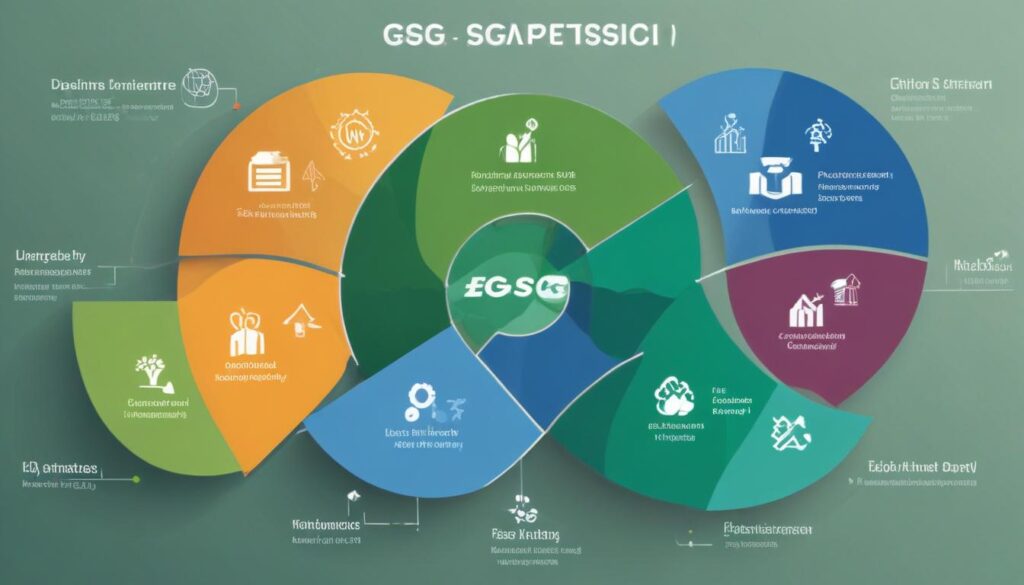The best ESG reports are characterized by transparency in key metrics like carbon footprint and board diversity, effective stakeholder engagement, and alignment with recognized frameworks, ensuring companies meet investor expectations and demonstrate commitment to sustainability.
Have you ever wondered which companies deliver the best ESG reports? In this article, we’ll dive into the top performers and their impactful sustainability practices.
What are the best ESG reports and why do they matter?
Understanding the best ESG reports is crucial for stakeholders as they provide insights into a company’s environmental, social, and governance practices. These reports enable investors to assess risks and opportunities related to sustainability.
One significant aspect of the best ESG reports is their transparency. High-quality reports offer detailed explanations of a company’s performance against specific metrics, allowing for easy comparison across industries. They typically address key areas such as carbon emissions, board diversity, and community engagement.
Moreover, the credibility of these reports is enhanced by third-party validation. When independent organizations verify the claims made in ESG reports, it builds trust among investors and consumers. This validation process is pivotal since it reduces the chances of greenwashing, where companies falsely present their practices to appear more environmentally friendly.
Another critical point to consider is the impact of ESG reporting on corporate behavior. Companies that publish robust ESG reports often see a positive shift in practices, driven by the need to comply with investor demand for sustainability. This trend aligns with the growing awareness of climate-related risks and their financial implications.
To summarize, the best ESG reports:
- Provide transparency and clarity on sustainability efforts;
- Include third-party validation to enhance credibility;
- Influence corporate behavior positively;
- Help investors make informed decisions regarding sustainability risks.
These elements not only enhance a company’s reputation but also align with the broader goal of fostering sustainability within the business landscape.
How do leading companies excel in ESG reporting?
Leading companies excel in ESG reporting through a combination of transparency, accountability, and stakeholder engagement. These organizations recognize that robust reporting not only enhances their credibility but also provides valuable insights for investors and consumers alike.
One of the key factors contributing to their success is the commitment to data-driven decision-making. By leveraging comprehensive metrics and performance indicators, these companies can showcase their environmental impact, social responsibilities, and governance practices. Regular updates ensure that stakeholders remain informed about progress and challenges.
Furthermore, top ESG report leaders prioritize stakeholder engagement. They actively seek input from investors, employees, and community members to understand expectations and concerns. This inclusivity fosters trust and strengthens relationships, vital components in today’s transparent business landscape.
Another essential aspect is adherence to industry standards. Leading companies often align their reports with globally recognized frameworks, such as the Global Reporting Initiative (GRI) or the Sustainability Accounting Standards Board (SASB). This alignment not only enhances credibility but also facilitates benchmarking against peers.
For clarity, here are some common practices among successful ESG reports:
- Frequent and detailed disclosures on ESG performance;
- Engagement with diverse stakeholders for feedback;
- Alignment with established reporting frameworks to enhance trust;
- Commitment to continuous improvement based on feedback and analysis.
These strategies collectively enhance the efficacy of ESG reporting, positioning these companies as leaders in sustainability and responsible corporate behavior.
What key metrics define a top ESG report?

Understanding the key metrics that define a top ESG report is essential for assessing a company’s commitment to sustainability. These metrics provide a comprehensive overview of a company’s environmental, social, and governance performance, allowing stakeholders to evaluate its impact and practices.
One critical metric is carbon footprint, which quantifies the total greenhouse gas emissions produced directly or indirectly by a company. This metric not only reflects the environmental impact but also signals the company’s efforts in reducing its carbon emissions.
Another important measure is board diversity which considers the gender, race, and background of board members. Companies with diverse leadership are more likely to make balanced decisions and establish a culture of inclusion.
Furthermore, community engagement is a vital metric that assesses how a company interacts with the communities it impacts. This can include charitable contributions, employee volunteer programs, and partnerships with local organizations.
To understand the primary metrics that define a top ESG report, here are some examples:
- Carbon emissions and reduction targets;
- Percentage of women and minorities on the board;
- Investment in community development;
- Employee health and safety statistics;
- Compliance with environmental regulations.
These metrics collectively enable stakeholders to gain insights into a company’s sustainability efforts, guiding investment and partnership decisions.
Successful strategies for improving ESG reporting
Implementing successful strategies for improving ESG reporting is essential for companies aiming to enhance transparency and accountability. These strategies not only boost a company’s reputation but also foster trust among stakeholders.
One effective approach is to establish a clear framework based on industry standards such as the Global Reporting Initiative (GRI) or Sustainability Accounting Standards Board (SASB). This ensures consistency and reliability in reporting, allowing stakeholders to understand and compare performance easily.
Regular training for employees involved in ESG reporting is also vital. By investing in education and resources, companies can equip their teams with the skills needed to gather and analyze data effectively. This leads to more accurate reporting and minimizes errors.
Another critical component is to engage with stakeholders regularly. Conducting surveys or holding meetings allows companies to gather feedback from investors, employees, and community members. This inclusivity helps in aligning the ESG practices with stakeholder expectations.
Lastly, establishing a robust system for tracking ESG performance metrics can significantly improve reporting quality. By utilizing software tools that automate data collection and analysis, organizations can save time and enhance accuracy. Here are some key strategies for effective ESG reporting:
- Adopting recognized reporting frameworks;
- Providing training to employees responsible for ESG data;
- Engaging stakeholders for feedback and concerns;
- Utilizing technology to automate reporting processes.
These strategies not only improve the quality of ESG reports but also demonstrate a company’s commitment to sustainability and responsible governance.
Comparative analysis of US and European ESG leaders
A comparative analysis of US and European ESG leaders reveals valuable insights into their differing approaches to sustainability and responsible governance. These distinctions are crucial for investors and stakeholders aiming to understand regional best practices.
In the US, ESG reporting often emphasizes shareholder value, driven by investor demands for transparency and accountability. Companies focus on quantifiable metrics, such as carbon emissions and board diversity, which are prominently featured in their annual reports. This data-driven approach aims to align with investor interests and ensure competitive advantage.
Conversely, European companies frequently adopt a broader perspective, integrating social and environmental concerns into their business strategies. European ESG leaders are known for committing to long-term sustainability goals, prioritizing stakeholder engagement, and promoting corporate social responsibility. These companies often align with the United Nations Sustainable Development Goals (SDGs), demonstrating a holistic approach to ESG practices.
Moreover, regulatory frameworks in Europe tend to be more stringent, mandating comprehensive disclosures that cover a wider range of ESG factors. This difference in regulations influences how companies operate and report their sustainability efforts.
Key points of comparison between US and European ESG leaders include:
- Focus on shareholder value (US) vs. stakeholder engagement (Europe);
- Quantitative metrics emphasized in US reports vs. qualitative narratives in Europe;
- Stricter regulatory requirements in Europe influencing disclosures;
- Long-term sustainability goals vs. short-term performance metrics.
Understanding these differences not only helps assess individual company performance but also provides a framework for companies globally to enhance their ESG strategies.
Future trends in ESG reporting you should know about.

Future trends in ESG reporting are evolving rapidly, shaped by increased regulatory demands, technological advancements, and shifting stakeholder expectations. Understanding these trends is vital for companies aiming to stay competitive and transparent in their sustainability efforts.
One notable trend is the increasing emphasis on real-time reporting. As businesses adopt digital tools, there is a growing demand for immediate access to ESG data, enabling stakeholders to monitor a company’s sustainability performance continuously. This shift is driving companies to enhance their data collection and reporting processes to ensure timely and relevant information.
Another trend is the integration of artificial intelligence and machine learning in ESG analysis. These technologies can analyze vast amounts of data, helping companies identify trends, assess risks, and improve decision-making. This predictive capability will allow organizations to be more proactive in their sustainability strategies.
The focus on climate risk disclosure is also gaining traction. Stakeholders increasingly expect companies to detail how climate change could impact their operations, necessitating robust scenario planning and risk management strategies. This trend aligns with global initiatives calling for greater ESG transparency, particularly related to environmental impacts and vulnerabilities.
Key future trends in ESG reporting include:
- Real-time ESG data availability;
- Integration of artificial intelligence for data analysis;
- Heightened focus on climate risk disclosure;
- Alignment with global sustainability frameworks;
- Increased stakeholder engagement and feedback mechanisms.
Staying ahead of these trends will not only improve a company’s ESG performance but also enhance its reputation and stakeholder trust.
In summary, understanding and improving ESG reporting
ESG reporting is more important than ever as investors, customers, and communities demand transparency and accountability from companies. By focusing on key metrics, embracing future trends, and adopting successful strategies, organizations can enhance their reporting practices.
As companies navigate this landscape, they can create a stronger connection with stakeholders while also fostering a culture of sustainability and responsibility. This proactive approach not only protects the environment but also drives long-term success.
Ultimately, better ESG practices are not just about compliance; they are about integrating values into business operations. Companies that lead in ESG reporting today will be better positioned for success in the future.
Frequently Asked Questions about Best ESG Reports
What are the key metrics in an ESG report?
Key metrics in an ESG report include carbon footprint, board diversity, community engagement, and compliance with regulations. For instance, transparency in carbon emissions can help stakeholders quickly assess a company’s environmental impact, which is crucial for informed decision-making.
How can companies improve their ESG reporting?
Companies can enhance their ESG reporting by adopting industry frameworks, training employees, and engaging stakeholders. For example, using the Global Reporting Initiative (GRI) ensures consistency and credibility, making reports more accessible for investors and the public.
What future trends should companies watch in ESG reporting?
Companies should pay attention to trends like real-time reporting and AI integration. Real-time access to ESG data allows stakeholders to monitor performance continuously, while AI can streamline data analysis and improve accuracy in reporting.
What differentiates US and European ESG leaders?
US companies often focus on shareholder value, while European firms emphasize stakeholder engagement and broader sustainability goals. This difference influences their reporting practices, with US reports frequently highlighting quantifiable metrics compared to the qualitative narratives common in Europe.
Is it beneficial to align with global sustainability frameworks?
Yes, aligning with global frameworks like the UN SDGs can enhance a company’s credibility and accountability. It signals to investors that the company is serious about sustainability, potentially attracting more investment and improving its market reputation.
What impact does effective ESG reporting have on a company?
Effective ESG reporting fosters trust and transparency with stakeholders, enhancing a company’s reputation. Companies with strong ESG commitments often see improved investor interest and customer loyalty, which can positively impact their long-term success.


